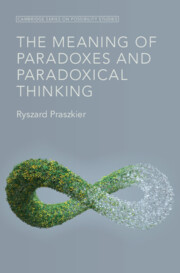Book contents
- The Meaning of Paradoxes and Paradoxical Thinking
- Cambridge series on possibility studies
- The Meaning of Paradoxes and Paradoxical Thinking
- Copyright page
- Contents
- Figures
- Tables
- Acknowledgments
- Introduction
- Part 1 Paradoxes and What They Do to Us
- Introduction
- Chapter 1 Defining the Concepts
- Chapter 2 Mind and Paradoxes
- Chapter 3 The Influence of Paradoxical Thinking and How to Evaluate It
- Discussion and Summary
- Part II Sudden Unexpected Changes
- Part III Challenging the Impossible
- Part IV Peace and Its Challenges
- Part V Paradoxes and Creativity
- Part VI Paradoxes in Action
- References
- Index
Chapter 3 - The Influence of Paradoxical Thinking and How to Evaluate It
from Part 1 - Paradoxes and What They Do to Us
Published online by Cambridge University Press: 04 April 2025
- The Meaning of Paradoxes and Paradoxical Thinking
- Cambridge series on possibility studies
- The Meaning of Paradoxes and Paradoxical Thinking
- Copyright page
- Contents
- Figures
- Tables
- Acknowledgments
- Introduction
- Part 1 Paradoxes and What They Do to Us
- Introduction
- Chapter 1 Defining the Concepts
- Chapter 2 Mind and Paradoxes
- Chapter 3 The Influence of Paradoxical Thinking and How to Evaluate It
- Discussion and Summary
- Part II Sudden Unexpected Changes
- Part III Challenging the Impossible
- Part IV Peace and Its Challenges
- Part V Paradoxes and Creativity
- Part VI Paradoxes in Action
- References
- Index
Summary
This chapter reviews ideas and studies that confirm the positive consequences of paradoxical thinking. It also presents methods for measuring an individual’s propensity to accept paradoxes and embrace contradictions. There seem to be a need for the establishment of a “science of contradictions” to explore the intricate psychological and social processes through which contradictions arise. Research demonstrates that a paradox mindset is associated with optimism and persistence, particularly in the face of failures. Individuals with a paradox mindset respond to a contradictory situation by cultivating optimism about their ability to navigate challenging situations. Investigating the root causes of Toyota’s success, a paper concludes that Toyota prospers by creating contradictions and paradoxes in various aspects of organizational life. Some methods for evaluating paradoxical thinking are presented, concluding with the author’s Influence of Contradictions Questionnaire (ICQ), validated and including twelve statements. This book focuses on paradoxes and the variety of their occurrences and reflections on their definitions, especially regarding paradoxes being carriers of a higher-level meaning. It does not contradict Aristotle’s law of non-contradictions (LNC).
Keywords
- Type
- Chapter
- Information
- The Meaning of Paradoxes and Paradoxical Thinking , pp. 24 - 27Publisher: Cambridge University PressPrint publication year: 2025

